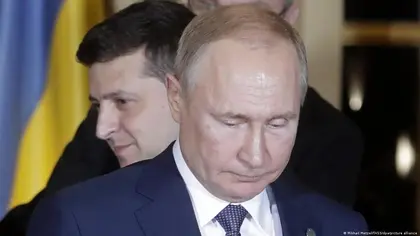Most people would say Ukraine has gained the upper hand in its fight with Russia and that, with the Ukrainian army on the march and NATO weapons deliveries to Kyiv ratcheting up from impressive to outright flood, the Kremlin would be wise to cut its losses, declare victory, and get out.
Vladimir Putin is not most people.
JOIN US ON TELEGRAM
Follow our coverage of the war on the @Kyivpost_official.
That the Russian leader and his army are firmly wedged between a rock and hard place in their “Special Military Operation” in Ukraine, and that things really do seem like they will get worse for them, is a reality that even state-run Russian media is having trouble ignoring.
Russian artillery ammunition depots, under devastating fire by precision-guided American rockets outranging pretty much the entire Kremlin arms inventory, are blowing up like holiday firecrackers in a rural southern US state. Russian frontline units are so short of riflemen that one of Putin’s closest allies, former Kremlin chef Yevgeny Prigozhin, is reduced to giving speeches to convicted murders and robbers in federal prisons, to drum up volunteers.
In the Kherson sector, Moscow decided a Ukrainian attack was coming to hit a Russian bridgehead on the north bank of the mighty Dnipro River. After the Kremlin sent thousands of troops to beef up defenses, Ukrainian long-range rockets picked off the Dnipro’s bridges one by one, trapping the defenders on the wrong side of the river.
Just over the last two weeks the Armed Forces of Ukraine (AFU) liberated more than 6,000 square kilometers of land and captured intact so many Russian combat vehicles (close to 300 at last count), that “Russian Lend Lease” is now an old joke across the Ukrainian army.

Brace for 2028: EU Urged to Prepare for Potential Russian Aggression
At the Shanghai Cooperative Organization conference, India and China’s leaders both told Putin, in public, the war in Ukraine needs to end, and soon. Even the President of Tajikistan and Kyrgyzstan made Putin stand and wait a minute before meeting with him on live television. The commander-in-chief of the most massive nuclear arsenal on earth stood there pretending to read notes, shifting from foot to foot like a schoolboy before a test.
At home, nationalists like Igor Girkin, Russian police state tactics be damned, are slamming Putin’s conduct of the war and placing the blame for Russia’s critical error – gross failure to see that the Ukrainians would not welcome the army of a corrupt, oligarch-ridden police state into their country, and instead would fight their invaders tooth and nail – directly at Putin’s doorstep. The army leadership seems dead set on following even the most absurd orders. In the wake of the Kharkiv offensive, with the Russian army reeling, reserves expended, and the AFU charging forward, the Russian military high command kept on launching, almost daily and always unsuccessfully, attacks in central Donbas. Hundred-man RF infantry companies are at one-fifth strength, and worse.
But declaring victory and getting out is not an option for Vladimir Putin, because, like they say in Civics 101, the true difference between a Democracy and a Dictatorship, is that a Democracy can have an awful leader and remain legitimate in the eyes of the people, but a Dictatorship – never.
The Russian political process is pretty consistent: Losing a war triggers regime change and persons deemed responsible are punished. The Russian people themselves know the war was a mistake, but they don’t feel it was theirs. All the Kremlin high rollers – the spies, the generals, the industrialists, the regional satraps – almost certainly want the war to end, but they want to protect their personal income streams much more. Nothing places a top Kremlin functionary’s status in greater risk than being tarred with some part of a military defeat. Time-honored Kremlin tradition teaches that the best way to avoid this is to keep one’s head low and pin any errors real or imagined on someone else.
Since he was in charge and it was his idea, any conclusion to the war would, for Putin, become at best a ticket straight to retirement. His career succeeded in large part on the strength of an image of infallibility and by shifting responsibility for failure to others. As a seasoned Kremlin operative, Putin knows all the vested interests and money that badly need him, or someone, to become the fall guy for the Ukraine war. A Stalin might have such enemies shot, but Putin is not Stalin. The only possible solution for Putin, therefore, is to keep the war going, in some shape or form, and maintain the fiction that he still knows what he’s doing.
It’s not a question of when Ukraine will win the war. It’s a question of when, in Russia, Putin’s fiction about his war in Ukraine, will become unsustainable.
You can also highlight the text and press Ctrl + Enter










